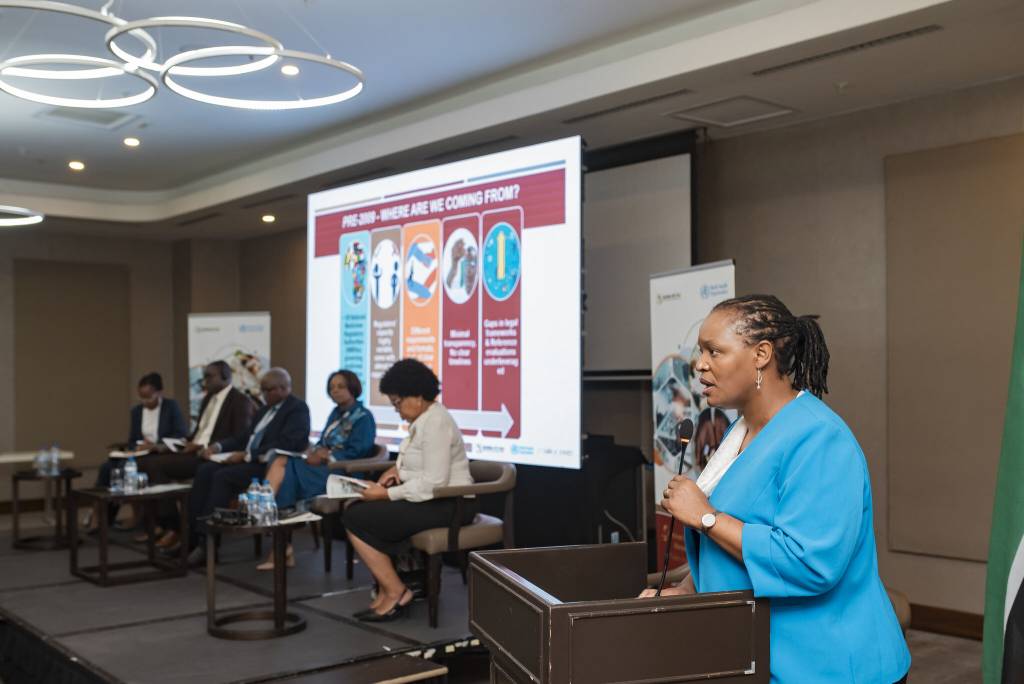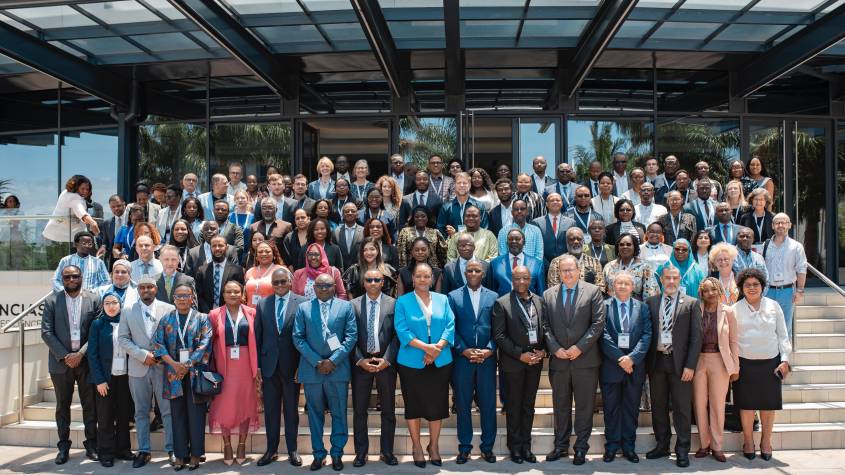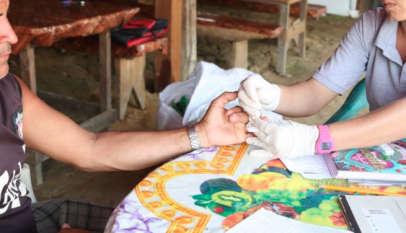INTERVIEW | How We’re Coordinating Africa’s Fight Against Substandard, Falsified Medicines – AMRH Head
Ms Chimwemwe Chamdimba, Head of the African Medicines Regulatory Harmonization (AMRH) Initiative at the African Union Development Agency (AUDA-NEPAD), reflects on AMRH Initiative’s 15 years stride to unify Africa’s medicines regulatory systems in a bid to combat substandard and fake products.

Newspage: The 4th African Medicines Regulations and Harmonisation (AMRH) Week is currently ongoing here in Maputo, Mozambique. The first edition of the AMRH Week took place in 2018 at Kigali, Rwanda. How has the AMRH Week evolved?
Ms Chamdimba: The AMRH Week is a platform that unite regulators, policymakers, private sector, the media and civil society to reflect on progress and challenges in our efforts to improve access to quality assured, safe and efficacious medical products on the continent. The AMRH Week has been a journey full of successes and challenges yet we have always worked to find solutions to the challenges.
This year’s commemoration marks 15 years of the AMRH Initiative. We are reflecting on this journey by looking at the lessons we have gained over the years and trying to chart a way forward based on these lessons. When we started in 2009, we didn’t have the systems and structures we have today. The National Regulatory Agencies (NRAs) were working independently; they were not sharing information and collaborating as they were supposed to.
Because our borders are porous, if say the NRA in Mozambique approves a product it will naturally be found in surrounding countries. Therefore, Mozambique’s neighbors like Tanzania and Malawi need to also trust and have confidence about the same product hence the need for the African NRAs to work together. However, the challenge in the past was that there were no harmonized systems, processes and structures to allow the various NRAs to work together.
Thanks to the launch of African Medicines Regulations and Harmonisation (AMRH) Initiative in 2009, we have seen these countries coming together and launching regional platforms for collaboration and coordination. It was after commencing implementation of the AMRH Initiative we realized we needed a platform that will bring all stakeholders together hence the birth of the AMRH Week.
Harmonization is needed more than ever before considering the challenges we are facing as a continent and taking cognizance of the evolving nature of our pharmaceutical industry. We can’t develop our pharmaceutical industry without robust regulatory systems. As a result of these efforts, we have overtime seen significant improvements and changes happening in our regulatory landscape including the establishment of the African Medicines Agency (AMA).
Newspage: One of the key objectives of the AMRH Week is fostering innovative responses against substandard and falsified (SF) medicines. How has this been achieved this so far?
Ms Chamdimba: The entire work of the AMRH Initiative is focused on ensuring access to quality assured, safe, and effective medical products which can only be achieved if the continent is free of SF products. This is not only a challenge for some countries rather it is a common challenge for all African countries and if they are not able to come together to resolve it, we will not be able to make the desired progress because products don’t stay within national boundaries rather, they always find their way across borders.
Therefore, if countries are not able to work with their neighbors, getting rid of substandard products won’t be possible since they will always find their way into neighboring countries. This year, the African ministers of health met in Addis Ababa under the Specialized Technical Committee on Health, Population and Drug Control (STC-HPDC) where they adopted a declaration on dealing with substandard and falsified medical products on the continent.
The declaration streamlines and stipulates what we must do collectively as a continent to eradicate substandard and falsified products. It will help us detect them, know where they are and strengthen our laboratory capacities, which we are also addressing through the African Medicines Quality Forum (AMQF), by firming up laboratory capacities to be able to detect substandard and falsified products. It will also help us address challenges around availability of data and information sharing among African countries.
For instance, if a product that is substandard or falsified is identified in Mozambique and neighboring countries like Zimbabwe and South Africa are alerted, they will also be able to know and deal with it. That is a significant milestone that was achieved by the ministers of health through the declaration. As part of the decisions contained in the declaration, the ministers agreed to develop a continental plan on substandard and falsified medical products.
They gave us i.e. AUDA-NEPAD the mandate to, in collaboration with AU sister agencies, lead these efforts. We have already drafted that plan and it is part of the documents we are consulting on in this AMRH Week. The heads of the NRAs are going to be discussing it as well after which we will have an approved plan to implement starting from 2025 towards ensuring more coordinated efforts in the fight against substandard and falsified medical products on the continent.
Newspage: The African medicines space is challenged by lack of policy harmonization and effective coordination mechanisms. How has the AMRH Week fostered effective policy harmonization, strong coordination and alignment among the various NRAs?
Ms Chamdimba: The Medicines Policy and Regulatory Reforms Technical Committee (MPRR-TC) is one of the AMRH technical committees sitting in this AMRH Week which supports African countries to undertake policy and legal reforms that will enable them to work together to eradicate SF products. Moreover, we are this year reviewing the AU Model Law on Medical Products Regulation, endorsed by AU Heads of State and Government in 2016.
The model law provides a comprehensive legislative template for African countries that can be adopted and adapted by national governments and Regional Economic Communities (RECs) to harmonize regulatory systems. During the course of this AMRH Week, there will be more discussions around how we can foster adoption of these continental tools and guidance documents developed to help African countries undertake the necessary reforms that will improve and harmonize their regulatory systems.
The review of the model law becomes necessary because of the challenge we faced during Covid-19 when African countries were not able to expedite approval of crucial medical products because of regulatory hurdles hence we could not move medical products to where they were needed. The draft model law has now been revised and approved by the ministers of health. We are now waiting for the approval of the ministers of justice and the AU system.
Newspage: Now that the African Medicines Agency (AMA) is about to be operationalized, how do you hope this will foster improved coordination and harmonization of policies in terms of medicines regulations in Africa?
Ms Chamdimba: The African Medicines Agency (AMA) was our intended destination when we were starting the AMRH Initiative in 2009. We knew getting 55 countries working together will not happen overnight. Therefore, we started by working to get countries within the 8 AU-recognized Regional Economic Communities (RECs) to adopt harmonized standards and adopt regional processes for undertaking regulatory activities such as joint assessment of applications, product registrations and joint Good Manufacturing Practice (GMP) inspection.
We are now working to foster cooperation among countries of different regions for example South Africa or Mozambique in the Southern African Development Community (SADC) working with Senegal or The Gambia in the Economic Community of West African States (ECOWAS). We need to work together as a continent because diseases can easily move from East to West and North to South. Thus, AMA is not only going to strengthen our regulatory systems but also facilitate that cross-regional coordination of harmonization in a sustainable manner.
Newspage: How is your work linked to the Pharmaceutical Manufacturing Plan for Africa (PMPA) and the African Continental Free Trade Area (AfCFTA), which seek to foster intra-African trade in all sorts of goods including pharmaceuticals?
Ms Chamdimba: Our work perfectly aligns with Agenda 2063. The AfCFTA is an important tool of the AU and trade in pharmaceuticals is one of the priority value chains of the AfCFTA. However, that needs to be unlocked and the only way we will be able to unlock continental trade in pharmaceuticals is if we harmonize regulatory systems because without common standards and regulations for medical products, we will not be able to trade in pharmaceutical products.
So, what the AMRH Initiative has been doing as a pathfinder for AMA is enabling the continent to adopt common standards for regulation of medicines. We also support the different regulators across Africa to be able to recognize each other’s decisions. That is the only way we will be able to unlock trade in pharmaceuticals. You can now see the complementarity between AfCFTA and AMA as well as AMRH.
This means the AfCFTA will not be able to achieve its goal of boosting continental trade in pharmaceuticals without unified continental standards, and regulatory systems that are harmonized to unlock trade in pharmaceuticals. So, all these will ultimately culminate in the achievement of the continental Agenda 2063, which seeks a more developed and prosperous Africa. We can’t ignore health and pharmaceuticals in that agenda.
Editor’s Note: This interview has been edited for length and clarity. It was conducted at the 4th AMRH Week in Maputo, Mozambique.














